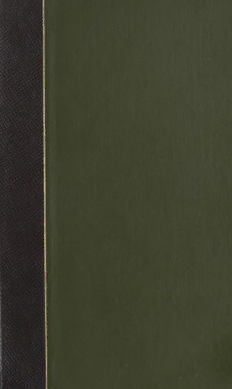
The Asloan Manuscript: A Miscellany in Prose and Verse Written by John Asloan in the Reign of James the Fifth PDF
Preview The Asloan Manuscript: A Miscellany in Prose and Verse Written by John Asloan in the Reign of James the Fifth
NAT LAND This book must be returned to the above address as soon as the reader has finished with it, and in any cgse not later than ONE MONTH from the date of issue. If the book is required for a longer period a special application to this effect must be received not less than three days before the book is due for leaders should not refund postage to the Scottish Central Library, but should consult their Local Librarian about local practice. S'GS. ^T£S'2,1£\- NATIOI^AL LIBRARY OF SCOTLAND .' - Central Library for Students. — This Book is'due for return ON OR BEF/iRE THE DATE LAST MARKED BELOW, unless any extension of time is grante NO. r ruiwszs JX. -6. JAN’1939 25. JUL 1948 £be Scottish Eeyt Society The Asloan Manuscript The Asloan Manuscript A Miscellany in Prose and Verse WRITTEN BY JOHN ASLOAN IN THE REIGN OF JAMES THE FIFTH EDITED BY W. A. CRAIGIE, LL.D., D.Litt. RAWLINSON AND BOSWORTH PROFESSOR OF ANGLO-SAXON IN THE UNIVERSITY OF OXFORD VOL. I. Prmteti for % Societg bg WILLIAM BLACKWOOD AND SONS EDINBURGH AND LONDON 1923 CARNKG1E !< I I t U : 1. U 0 i i k W O i Printed in Great Britain All Rights reserved $lC'% PREFACE. This volume contains the first half of the contents of the Asloan manuscript in its present imperfect state. With the exception of the second, all the pieces com- prised in this portion of the manuscript are in prose, whereas the second half is entirely in verse. Of the ten pieces here printed only two or three have any intrinsic interest, and the only one which has more than a linguistic value is the seventh, which has preserved many otherwise unrecorded incidents from Scottish history of the fifteenth century. The following is a summary account of the various items. I. A long and dull treatise on Penance and Confession, in eleven chapters and extending to 80 pages. The author is not named in the treatise itself, but in the original table of contents it is assigned to “ Master Jhon Irland,” the author of another prose work of which the greater part remains unpublished, though some extracts from it have been given by Professor Gregory Smith in his ‘ Specimens of Middle Scots,’ p. 92. The text of this piece appears to be complete, and on the whole free from serious errors of transcription. II. A metrical version of the well-known moralising account of the game of chess by Jacobus de Cessolis, of which Caxton’s ‘ Game and Playe of the Chesse ’ is also a translation. The Scottish version is not based upon Caxton’s work, but on the Latin original, as is shown VI PREFACE. by the forms of the proper names. The strange disguises under which many of these appear need not be entirely laid to the account of the translator or scribe; a number of them occur in copies of the Latin text, and some may be due to the author of the work. The translator has abridged the matter to some extent, more especially in the later sections. There are also one or two obvious omissions in Asloan’s text, probably due to missing leaves in the copy he had before him. One leaf (fol. 53) has been supplied by a later hand ; it was probably copied, not very correctly, from a tattered leaf which was then destroyed. The whole piece was printed in a black-letter quarto by Sir Alexander Boswell at the Auchinleck Press in 1818, with a dedication to Thomas Thomson. The title- page bears the words Frondes Caducce; the half-title, in red, is The Buke of the Chesse. As only forty copies were printed, the volume is scarce. III. A sketch of Universal Geography, which proves to be in part a copy of various chapters from Trevisa’s translation of Higden’s ‘ Polychronicon ’—viz., ch. 5, 6, 7, 11 and 9 of the first book. Either an inferior text was employed, or Asloan was careless, for the errors and omissions are numerous, and not a few passages are mis- leading or meaningless. IV. The full text of the ‘ Porteous of Nobleness,’ of which otherwise only a fragment (the last five pages) of the edition printed by Chepman and Myllar in 1508 has been preserved. The fragment begins at line 19 of p. 180, with the words “ nor compt of his lyf.” As the texts correspond very closely there is every likelihood that Asloan copied from the print, although he has omitted the colophon, which states that the work was “ translatit out of franche in scottis.” The text of the fragment may be found in
